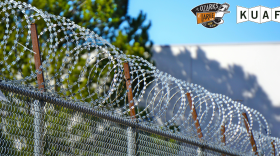In 2019, the FBI satellite office in Fayetteville stepped up efforts to address exploitation and sex trafficking of minors in Northwest Arkansas.
According to the FBI office in Little Rock, the agency worked 31 cases of child exploitation or human trafficking that year and in 2020 the number of cases jumped to 106. The most recent numbers from 2021 showed 67 child exploitation cases were filed.
Special Agent Brennan DeSpain is in charge of the Arkansas Child Exploitation and Human Trafficking Task Force in Fayetteville. He said although the actual number of cases of trafficking victims can be hard to quantify, he believes the problem is prevalent in the area.
"We have dedicated officers that area working it full time," DeSpain said. "That kind of gives an indication of how prevalent it is, and I believe its always been this way, it's just that we've gotten better at identifying and addressing it."
Since 2007 nearly 1,500 Arkansans were reportedly victims of some form of human trafficking, according to numbers from the National Human Trafficking Hotline. The types of trafficking that the task force encounters includes forced labor trafficking, sexual abuse and familial trafficking.
DeSpain said since January the task force has seen a spike in undocumented minors forced or coerced into labor - often in restaurants or factories. He said the agency works with people who are poised to notice and report these types of crimes.
"And that's people at schools, school officials and teachers," DeSpain said. "If you look at what happened during COVID, when the schools were shut down, the reporting dropped dramatically."
He said one of the biggest hurdles for his agency is getting people to understand that human trafficking might not match the image many people have of the situation. During a meeting with area landlords in June, DeSpain said people wanted to know specific neighborhoods where this was happening. But he said it's not that simple.
"It's not so much tied to a location," DeSpain said. "But, it's more so associated with victims who are more susceptible to being groomed."








